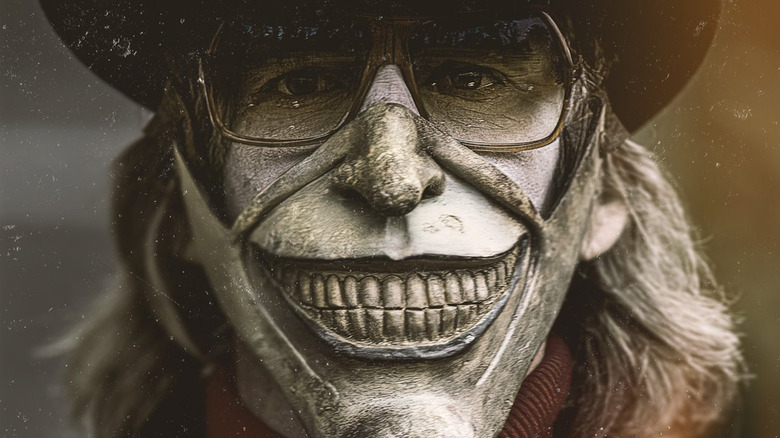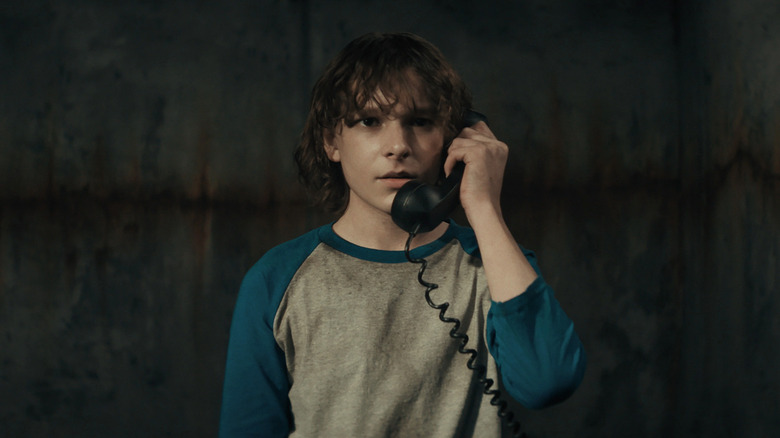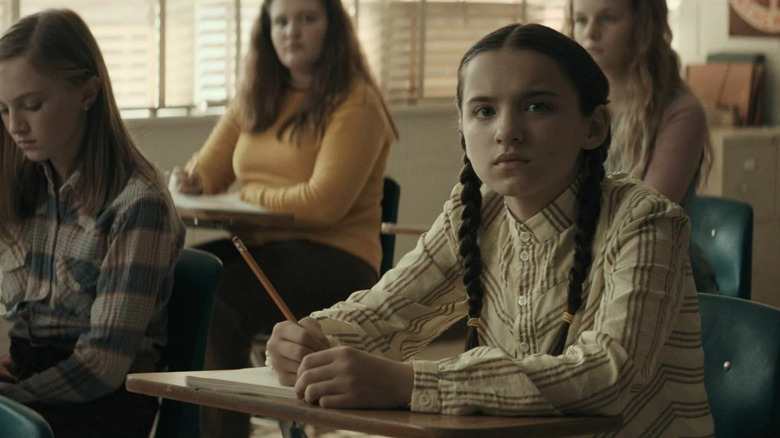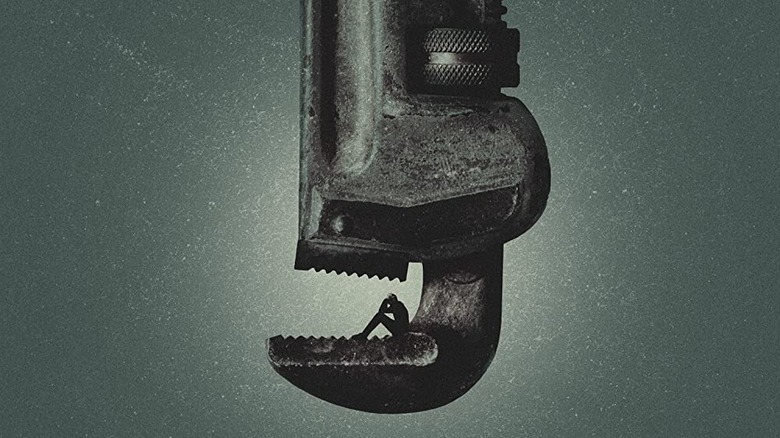Scott Derrickson Talks Directing The Black Phone And Shadowprowler Ahead Of Their Home Video Release - Exclusive Interview
"The Black Phone," Scott Derrickson's big screen adaptation and expansion of Joe Hill's 2004 short story of the same name, has been one of the major horror sleeper hits of Summer 2022. Set in 1978, this thriller stars Ethan Hawke as a masked magician and child murderer known as The Grabber and young actor Mason Thames as Finney, The Grabber's latest kidnapping victim who must figure out how to survive and escape with some supernatural assistance.
With "The Black Phone" now available on digital and coming to DVD and Blu-ray on August 16, Looper got the chance to speak with Derrickson about the film as well as his quarantine short film "Shadowprowler" included on the home video release. Due to pre-existing agreements, Derrickson couldn't disclose anything about "Doctor Strange in the Multiverse of Madness," which he was going to direct before Sam Raimi took the helm, or the status of the "Labyrinth" sequel, which he was announced to be attached to in 2020. But Derrickson's commentary on his recent horror hit proved thoughtful and interesting.
Scary strangers and horrors at home
I was telling a friend about "The Black Phone," and I said, "It's about a kid who gets kidnapped by a serial killer, and the ghosts of the killer's previous victims help him escape." She responded, "Oh, like 'Coraline'?" She's not exactly wrong in that comparison. Was that a comparison that crossed your mind at any point while making this film?
No, not at any point, actually. That's the honest answer.
One thing I appreciated about your adaptation is that while the premise could easily serve as a reductive "stranger danger" tale, the film makes it clear that abusers can also be parents and classmates and people you think you know and trust. How would you go about fleshing out these themes?
I don't really start with a theme and work outward. I tried to tell the truth about the characters and the world that they're a part of. In this case, so much of it was drawn from my personal life. I lived in that "stranger danger" time. Growing up in north Colorado, Ted Bundy had just come through there, and the Manson murders had recently taken place. My friend who lived next door to me, his mother was abducted and murdered, so the presence of the silent killer who could abduct you was very real for everybody in my neighborhood.
There was violence in my house and domestic violence in a lot of the houses around me. I was trying to capture the kind of fearful, unstable, violent world that I grew up in when I was that age and thought that if I could capture it realistically, that time and place, it would be a great setting for this particular story. It was much more about trying to be honest and truthful in the characters I was creating than trying to work out anything thematic.
If you or someone you know is dealing with domestic abuse, you can call the National Domestic Violence Hotline at 1−800−799−7233. You can also find more information, resources, and support at their website.
The role of religion in Scott Derrickson's films
Religion and spirituality are major themes throughout your filmography. In "The Black Phone," this is most obvious with Gwen's storyline. How much of the storyline was drawn from your own struggles with faith?
Oh, boy, that's a good question. This may sound like a cop-out answer, but everything that I ever work on is drawn out of my own struggles with faith. That's one of the most consistent parts of my experience as a human being. From the time I was a toddler, from the time I had some of my earliest thoughts and feelings, there was a desire, a need to reckon with the metaphysical, and it's never gone away. That is so integral to my experience of the world and how I see the world — how I have always experienced the world and continue to grow in my perspective on that — that it becomes an inescapable part of storytelling for me. I certainly never have an agenda to try to share my view of the world when it comes to these things. That's of zero interest to me. But as a filmmaker, you can't help but put some of yourself and your perspective of human life into the stories you tell.
In this case, it was that I had Joe [Hill]'s story and I had Finney and I had The Grabber, and then I had the other dead kids who were ghosts. When talking with my writing partner [C. Robert Cargill], I said, "We need a girl at the center of this movie." The idea of the youngest character being a nine-year-old girl or a 10-year-old girl, whatever she is in the movie, and being the strongest of all the characters — I loved that idea.
The idea that she had her own private, personally constructed faith and belief — that was my experience when I was a kid. That was a part of me. Whatever my relationship with God was, was my own. I wasn't raised in church or anything like that. I thought that was interesting. It seems to really speak to people, the authenticity of her spirituality and how she feels it and thinks about it and uses it.
Making Shadowprowler with family during COVID
The bonus feature on "The Black Phone" home video release I'm most curious about is your new short film "Shadowprowler." What can you tell us about this short?
It was during the actual lockdown early in the pandemic. My house had burned down in 2018, so we had rented the only house that we could find in our area where my kids could continue being close enough to their school ... It was Kevin Sorbo's house, actually. We rented the house that he had lived in West Lake Village. I didn't like it. It was too big — too many rooms. [I'm] not a big Kevin Sorbo fan, either. But it was the only place that we could live. None of us liked it there, and then during the pandemic, suddenly we're locked in there. We can't go anywhere. We're locked in this house.
My oldest son is a musician. He's attending Berklee College of Music now. But [this was] early 2020, June 2020. My youngest son, [who was] 14 at the time, is interested in acting and is a very good actor. We decided, "Hey, let's make a film right here. We're here, we're stuck in this house — let's make a movie here in the house."
My son Dashiell had an idea that I thought was really good. I wrote a 10-page script with my writing partner, and then we shot this little 10-minute movie there. It's a real quarantine movie. [We] had a great, great experience, and the only actors in it are my two sons. It was something that we did for fun. Then, when I showed it to Jason Blum, Jason was like, "I love this. Let's put this on 'The Black Phone' DVD." I was like, "Okay." It was his idea to put it on the DVD. I had no idea what would ever happen with it, if anything.
Are there any plans to stream it?
I have no idea. That's a good question. My oldest son did the score for it — I should mention that too.
It's not a masterpiece or anything. It's just a fun little quarantine movie ... It probably won't stream. The DVD is a perfect little life for it. I like that it'll be out there somewhere and people can see it, but it's a bonus feature. People can enjoy. I did do a director's commentary with my son Dashiell, which is great too because we tell more about the story of making it, which is fun.
Have you worked with your son on any other films before, or do you plan on doing that in the future?
Yes. [My son Dashiell plays] "Jackass Number One." He's the kid who bumps into the pinball machine in "The Black Phone" that Vance Hopper throws into the magazine rack of Starlog Magazine ... I just shot another short film, which I can't talk about, that I'm really happy with. He had a lead role in that. He does a lot of school plays and has done some other film work. He's very good. He's going to have a nice career.
"The Black Phone" is now available on digital and comes to DVD and Blu-ray on August 16.
This interview has been edited for clarity.



